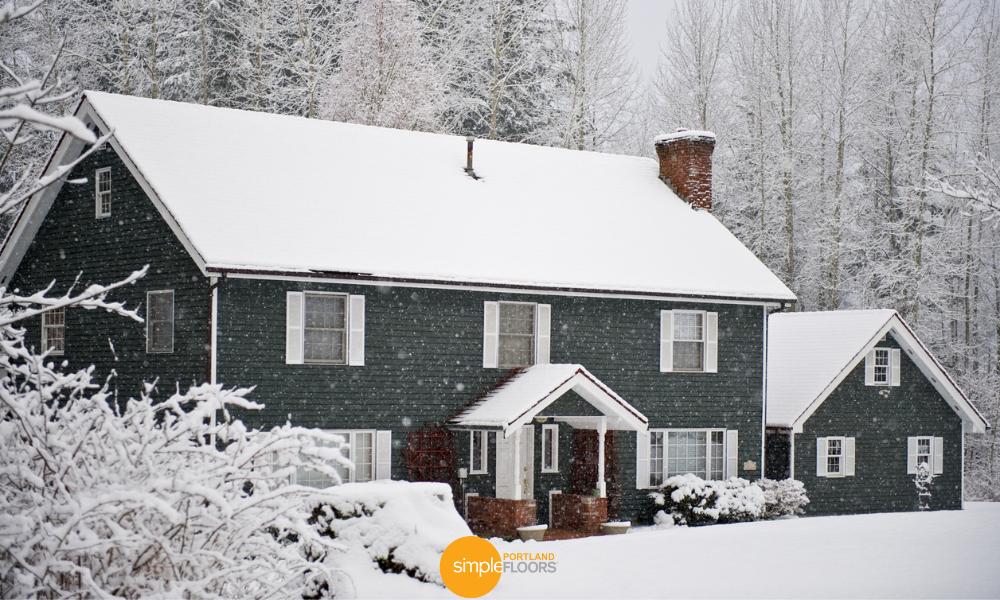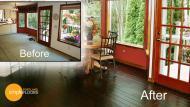Camping season is over, and winter is almost here. We may get a lot of rain, and sometimes ice and snow, but thankfully we don’t have to do anything crazy like put up storm windows or prepare the snowblower like in the other Portland.
Our weather gets pretty grey and cold starting in November and clears up the end of March. Our winters average between 40-60 degrees. Chilly but not freezing. We do get snow sometimes but not every year. And it’s usually light and melts quickly.
Tips for Getting Your Home Ready for Winter
Before winter weather hits, you’ll want to do a little home maintenance to ensure that the cold stays out, the heat stays in, and the water flows freely.
What to Do if Pipes Break
This usually happens if a home is left empty and we have an unusual freeze that lasts longer than a day or two. If you know, you’re going to be gone, and we’re going to have a cold snap, leave the heater on low so the house doesn’t go down below freezing. You can also leave on the faucet on a slow drip. That keeps water moving through the water lines.
Also, you may want to turn off the water lines to your outdoor faucets, and then turn them on, so all the water comes out. Then there’s nothing in the lines to freeze.
Inspect and Repair Any Roof Damage
While we don’t get much snow, we do get a lot of rain. We average 154.5 days of rain a year with 36″ of rainfall.
It’s important to maintain your roof to protect your home from rain and moisture damage.
Scour Your Home to Uncover Any Potential Leaks
While you’re out looking, spend some time under the house and in cabinets to ensure nothing is leaking. You may want to do it again while it’s raining so you can ensure there are no leaks coming in from your roof or any windows.
If you can catch a leak early, you’ll prevent water damage and mold from developing.
Preparing for Winter Storms
While it’s rare, it’s possible for us to get storms with heavy snow and ice, where it’s just best if we stay home and off of the roads. You should have a food and water supply on hand for emergencies, including earthquakes. It should provide a gallon of water per person per day plus extra for pets. And you should consider alternate forms of cooking like a camp stove (just make sure you cook outdoors or in a garage with the door open).
You will also want flashlights with extra batteries. Some people invest in special generators with solar panels to keep electronics charged.
You can get more ideas at the city of Portland’s emergency management page.
Do A Kitchen Deep-Clean
To heck with Spring cleaning. Winter is a great time to go through your gadget drawers. Keep a box or a bag at the ready for things that you want to donate or recycle. Then place things on the table and figure out where they should go.
Clear off your countertops and wash down your cabinets. This is the time to get rid of things that don’t belong in your kitchen.
If you have filters in the vent above your stove, check your owner’s manual about how to clean them. With luck, you just need to run it through a cycle in your dishwasher.
Pull all the food out of the pantry and wipe down the shelves. Lysol original is very useful for keeping away bugs. You’ll want to inspect pasta, rice, and flour to ensure there are no infestations. Then you can organize as you replace everything with the oldest in the front and the newest in the back.
For the bonus round, you can clean out your refrigerator and wipe down the gaskets to create a better seal.
Bring Tender Plants Indoors
If you keep plants in pots outdoors, you should consider bringing them in or finding them shelter during winter. They need to be protected from the ice, hail, sleet, and wind. Some nurseries can sell you frost blankets and burlap to wrap containers. You can use old sheets and blankets as well, but you’ll want to avoid plastic since air circulation is important.
Don’t Forget to Water!
Yes, we do get a lot of rain, and chances are you won’t need to water the outdoor plants. But if we get a dry season followed by a freeze, it can kill plants. And our coldest weather usually comes with drier air and clear skies. Moist roots will be more durable than dry ones.
For all your plants, you can use a layer of straw or leaves to protect the base of the plants.
Prepare Yourself
It’s important to take care of yourself as well as your home. If you feel gloomy when the weather is grey, invest in a full spectrum light that you can sit in front of each day for a little bit. Also, make sure you’re taking vitamin D.
At the height (or depth) of winter, it gets dark by 430pm. The Danes often light a lot of candles around the house, calling it “living light.” It may be something to consider if you would like more light in your home.
Plan for things to do, like curling up in a comfy chair and reading while sipping some great tea. Then have the books and tea available for days when you need a little self-care.
And finally, get out and move around. Buy clothes and boots that will keep you warm and dry, and go out and get some fresh air.









